Maurene Wallin was born Maurene Ellen Pickle on February 18, 1921 in Cherokee County, Alabama at Broomtown to Tim and Emma Pickle. Her sisters are Haynie Speer and Waynie Edge; her brothers, both deceased, were Wilburn Pickle and Harold Pickle.
Maurene and her husband, the late Bill Wallin, have one child, a daughter, Susan, who is married to Mike King.
The following is an edited transcript of an interview conducted on February 3, 2012 about Maurene's employment at the Trion Glove Mill.
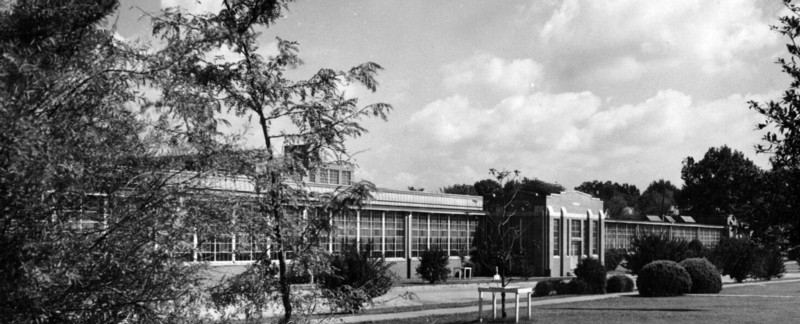
GOING TO WORK
I went up there just before I graduated from high school and put in my application. I needed the job. I never had a job where I made any money. They told me to come back after I graduated. My brother Wilburn and I graduated from Menlo High School on the 23rd day of May 1940 and I went to work in the glove mill the third day of June 1940. Thelma Espy - Thelma Willingham then - and I went all the way through high school together and went to work in the glove mill the same day. I was 19.
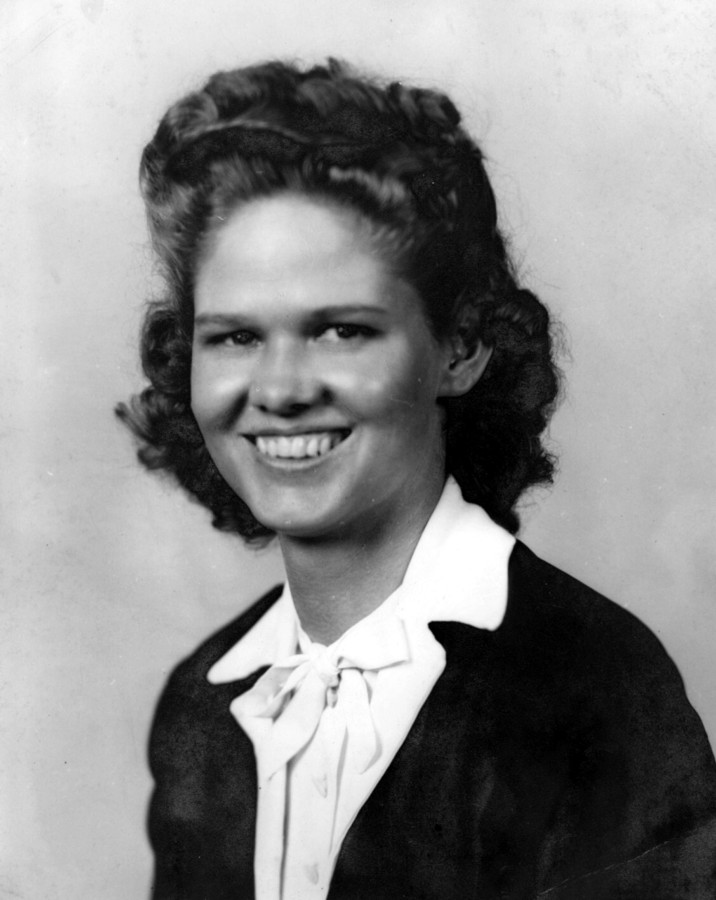
When those machines were running, when we were out in the lobby the day that we were hired, we could hear those machines a-going. It was a roaring sound and I couldn’t imagine what was going on in there until I got in there. It was a big place and was divided up into the kind of work you sewed. No partitions in it; it was open.
We went through a training session and when we were able to do the work without somebody having to watch all of our gloves, they put us in a unit. There were 35 in a unit. Some were “back girls,” we called it, when they sewed in the thumb and the fingers for us to close it up. The ones who sewed around the fingers were called closers.
We lived on the Tom Cook place in Menlo. I got up about four o’clock, milked two cows, washed the dishes after we ate breakfast, and I caught my ride up at the Barry place at seven o’clock. Pax Welch - “Shug” Welch’s sister - owned a car. We went to work at eight o’clock and got an hour for lunch at twelve, and went back at one o’clock and got off at five. By the time we got home it was about 5:30.
All of the girls wore a white uniform with a green collar and the supervisors had solid white uniforms. They didn’t furnish our uniforms; we had to buy them. I had about four and I could send them to the laundry. The laundry was owned by Riegel and you had to pay to have your uniforms laundered. We wore any kind of shoes we wanted to. Some wore tennis shoes.
It was warm in the winter, but hot in the summer. We didn’t have any air conditioner. A lot of the girls brought little fans and sat them down on the floor where it would blow on them.
At the end of the day on Friday, the supervisor took up our tickets and she carried them to the office. When I first went to work, they paid us in cash. We had a paymaster, Mr. Burrell Simmons. He’d come out on Friday and he had this big metal box with straps that went over his shoulders. He had all the supervisor’s names on the little boxes that sit down in that big one. He went to each supervisor and gave her her box with all of our money in it and she gave it out through the unit.
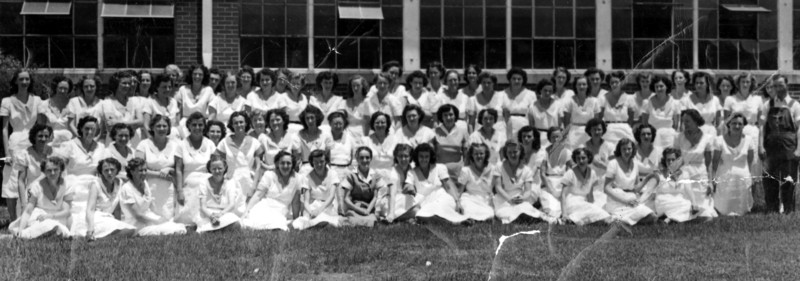
I was paid every week for the work I did the previous week. It took a lot of time to sort out all that money and put into different envelopes, as many girls as there were in the glove mill. Eventually, they paid us by check. It was cheaper for them and they saved money by not having as much help in the office.
I enjoyed working. It was different to what farm work was. It was nice to see your friends everyday. I liked the money most of all. It was a way of making a living. We had always been farmers and we didn’t have any money.
I made 30 cents an hour and worked 40 hours. That was $12. They took out a little Social Security on me, but that was all at that time. I’d always been taught to tithe. Out of that $12, I owed a dollar and twenty cents tithe, a tenth of it. After I got paid, I paid my ride bill and gave (the rest) to Mother.
AS THE GLOVE FITS
In the fall of the year when orders came in, we had a lot of orders on brown jersey. They put me on jersey and if you pulled on the fingers on that, you had a finger as long as your arm. Eventually I was put on canvas all the time. I sewed all the way around the glove without ever stopping.
I started making a lot more than production soon after I went to work and they put me on one kind of work and left me there. You got so much a box and there were 144 gloves to a box. I could sew a whole box in 20 minutes. It was piece work when I went to work. In all the years that I worked in the glove mill, I never took a break. When I stopped, my money stopped. I kept working. Before I left the glove mill, I was the highest paid employee out of all those girls.
Some of the gloves already had a plastic-like band on them and we had to sew that. We had to double stitch that to keep it from tearing loose when it was put on the turners to turn it. Some took a knit wrist. When we got through closing it up, the knit wrist girls got it and then it went to the turners from there. The turners put the gloves down over a form like your hand and then there was another thing that come down in your fingers and that pulled them up and turned them right side out.
When I first went to work, you stood on one foot and pedaled to turn the glove, but eventually they had automatic turners and there were four hands sticking up there and it turned around to give you time to put a glove on it. It was a lot easier then than it was to stand on one foot and pedal that thing all day. That was just about the hardest job in the glove mill.
At one time we made a double-brown, we called it, and it had two thumbs in it instead of one. They sold it to these states up north where they had a lot of corn. They called it the glove for corn husking people. When they wore out the palm on one side, they could turn it over and have the other thumb and use the back side. It was more economical to buy.
The gloves we were making were sold all around the world and overseas. The name Riegel was the name that went with the gloves. There were times of the year when the gloves didn’t sell as well as other times. I remember they’d have a lot of big boxes of gloves stored up in the front part of the glove mill. We could see them. When the gloves started selling good, they would just disappear almost overnight.
OCTOBER 1940 PANORAMIC PHOTO (SEE TOP OF PAGE)
We came back after lunch the day that picture was made. They told us that at a certain time to come back out to the park. They were going to make our picture. I don’t reckon there was any posing. The man that made the picture had a camera that moved to make a long picture like that. It was amusing to me. When I went to work, there was about a thousand girls and I bet there’s a thousand on that picture.

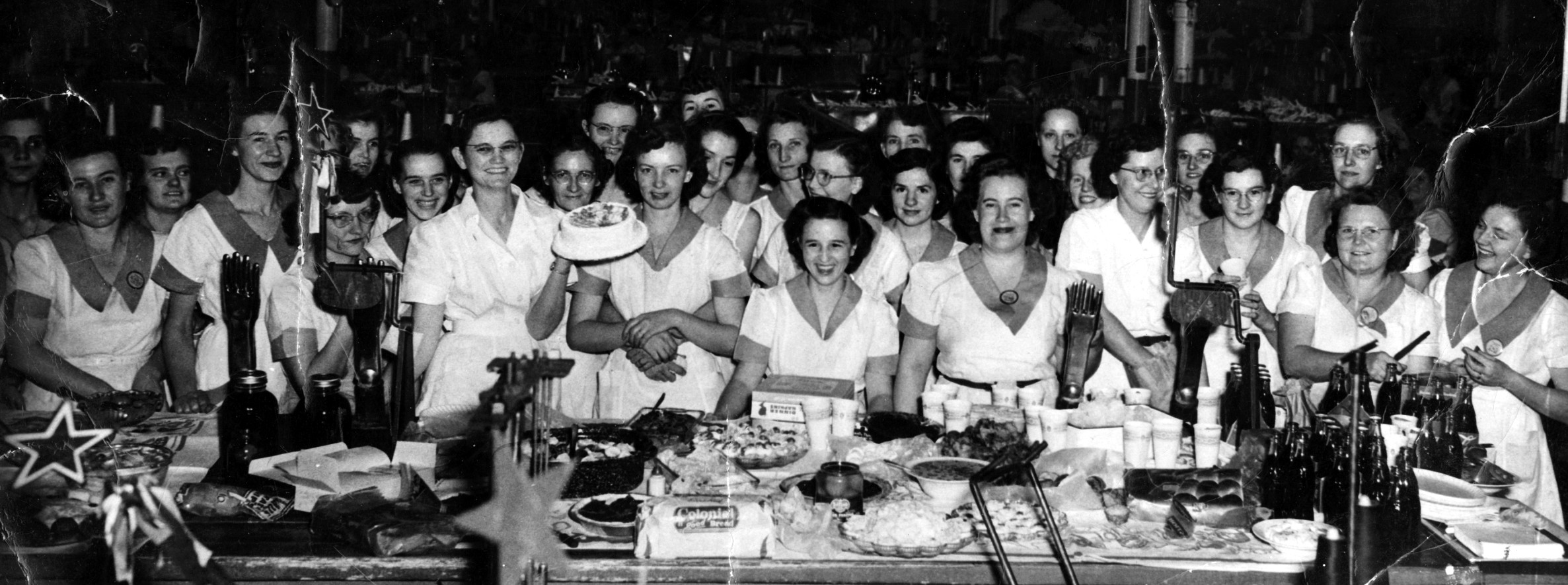
COWORKERS
I worked with Thelma Espy all the years that we were at Trion. I also worked with Pauline Rampley and Margaret Baker.
Carrie “Bill” Bryant was a supervisor and Edna Crowe was one. Joe Fay Denson’s mother, Virginia, was one of my supervisors. Katherine Hurtt was one. Geraldine Lawrence was the head floor lady at one time, but when I went to work, Clara Allmon was the head floor lady and her assistant was Viola Bridges.
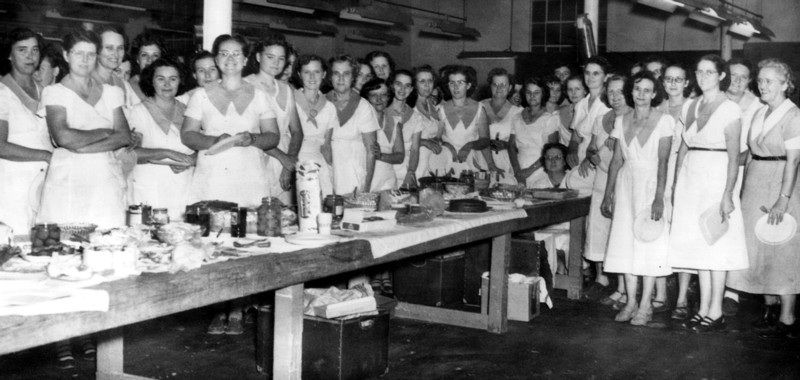
I was a supervisor at one time. The units had enlarged so much that it was hard for one supervisor to take care of all of the girls so they divided up the unit. Tip McCollum’s sister was over a unit. I guess there was fifty girls in that unit and it was more than she could take care of. I could do all of the operations of the glove so they divided up our unit and gave me the worst girls she had.
They gave me a rough time. I supervised for two or three years, but it got on my nerves so, I was about to crack up. They wouldn’t change me so Mother went up there and talked to Clara Allmon and they took me off the floor and put me back on the machine.
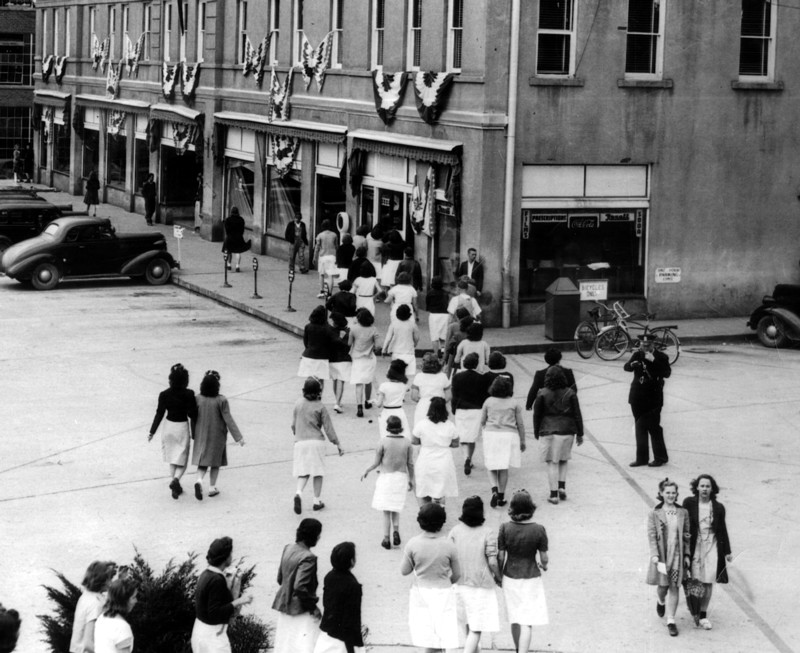
THE BIG FRIENDLY
For lunch, most of the girls went over to the Big Friendly department store. They had a big café in one part of it and we went out there for lunch, a lot of us did. When we finished our lunch, we would come back into the mill, but if we got there before time to go to work, we couldn’t operate our machines until the bell rang. You could get your work out and get it ready, but you couldn’t sew anything and you couldn’t fix menders.
At the Big Friendly what I almost always got was what they called Mexican pork chops, pork chops baked with different things on it. They were so tender you could cut it with a fork. And cream potatoes. They had Coca-Colas and tea. Anything you wanted, they had to drink. They served good food out there. Margaret Henderson, Hugh Henderson’s wife, worked out there and all their appliances were stainless steel and you could just about see yourself in them. I never will forget how clean it was.
I bought clothes over at the Big Friendly and anything we needed we could get it there. Certain days of the week, there were some salesmen out of Rome from different stores that people had bought from. They could pay there instead of having to go to Rome to pay their bills. They all bought it on the credit. They’d stand out in front of the store at lunch time and the girls would go and pay. They sold refrigerators, freezers, furniture, just any kinds from different furniture stores in Rome.
WEEKENDS
Some of us would go home with “Bill” Bryant. Carrie was her name, but everybody called her Bill. She lived out in the country and she had a garden and raised practically everything they ate. We’d go home with her and spend the night. We’d go to the strawberry patch and pick strawberries and we’d make strawberry ice cream. She had a little sister and she couldn’t talk. She always had supper ready when we got there.
EASY CREDIT
Miss Polly Bohannon was over the credit department at the Big Friendly. I bought the first refrigerator we ever had there, bought it on credit. She wore glasses and stood behind that little latticed-up place.
She said, “Young lady, do you plan to pay for this refrigerator?” She looked out over them glasses and I said, “Yes, ma’am.” She asked me a few more questions and I got it on credit, and boy, I showed her I was going to pay for it. I put everything I possibly could on it and I paid it off a lot quicker than I was supposed to. It was a small refrigerator, but we thought we were in heaven. After that, I bought a deep freeze. I didn’t have trouble getting it.
When I bought my first car it was a ‘49 Dodge Coronet six-passenger coupe. I didn’t know what I bought until that night when they met me at the mill with my car from Bankson. Mr. John Bankson owned the dealership. It was there where Stansell Furniture is now.
I had to fill out an application and tell how much I was making. When it went to the office at the finance company in Chattanooga, they didn’t believe how much I made.
They called down to the office at the glove mill and talked to the paymaster, Mr. Simmons, and he told them that was exactly what I made. He came out to my machine and said, “Are you fixing to buy a new car?” and I said, “Well, I hope I am. I have filled out the application and I don’t know if it will be approved or not.” And he says, “It will be approved. They didn’t believe how much you made, but I confirmed it and wanted to come out and tell you that you will get the car.” That was 1949 and I paid something over $2,000 for it. It was a lot of money back then.
REBELLION IN THE RANKS
There was a group of girls that I had when they first put me as supervisor, we had some that not many things went to please them. If it didn’t please them and you couldn’t straighten it out with them, they got up and stood out in the middle of the floor until somebody went and got Mr. MacArthur.
There was one girl, Ruby, that never went out with them. She always sat at her machine and sewed. When something went wrong, she just kept working like it pleased her real well. All the rest of them in the unit stood out in the middle of the big aisle. Somebody went out and got Mr. MacArthur and he settled it with them.
Maybe they felt like they didn’t get the proper rate on that glove, maybe it was harder to sew than some of the others and they just stood up until somebody corrected it. We couldn’t do anything about it, but Mr. MacArthur was over the whole thing and he could. They never did get into trouble.
WARTIME
When World War II started, we worked six days a week for all the time the war was going on. They made a camouflage material for the uniforms for the service men. It was a canvas, heavy material.
We had to have a button on our uniforms to identify that we were workers there. It was a wartime security measure and you didn’t get in unless you were identified.
They had victory buses that ran all three shifts at Trion. The victory buses were white and had orange stripes on them. The glove mill just worked one shift, but the cotton mill worked three shifts and a victory bus run on all three shifts. Some of the girls came from Alabama, maybe fifty miles farther away. People couldn’t find work where they lived so they came there to work. They were hiring girls in the glove mill all the time because some of them, about the time they got them trained, they didn’t like it and they left.
A lot of the women that worked there, their husbands had to go to war. Some of the ladies sons were in service. There were a few times that they had gotten the word that their son had been killed in action. Aunt Della Mitchell was one of them. I saw them when they come and got her. Called her out to the little lobby where we gathered in the mornings. When she didn’t come back for such a long time, I got up and went out there. When I got out there, Clara, the floor lady, was with her. Aunt Della was just a-screaming. Uncle Homer got somebody to bring him up there to tell her that (their son) Lonnie had been killed in action.
TRION'S 1945 CENTENNIAL CELEBRATION
They had a celebration and a beauty pageant. Eline (sp?) Baker carried a carload of us down to Summerville and we gave out tickets wanting them to vote for a certain person for the beauty pageant. We went down an afternoon or two after we got off from work. We went to all the merchants giving out those tickets. It had that girl’s picture on it that we were working for. Grace Leigh was the one we were working for and she was a real sweet person.
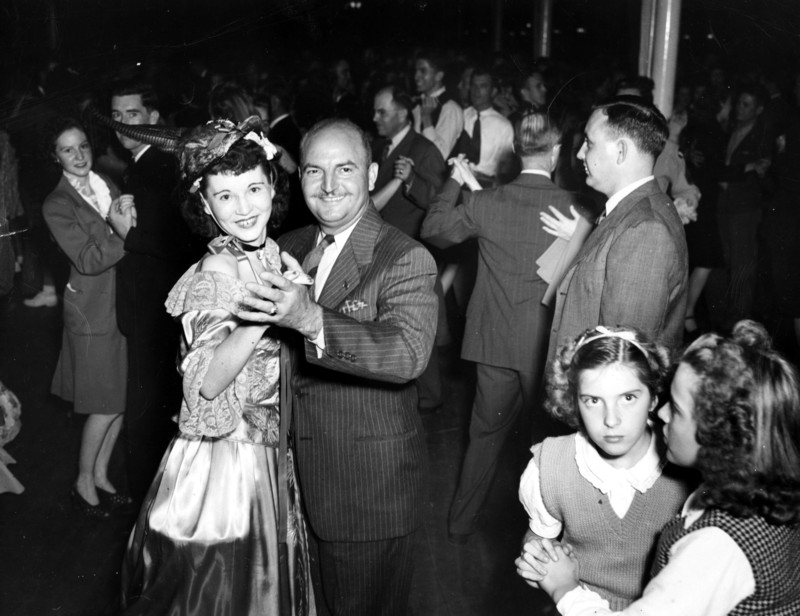
They had a lot of it up on the river and had a big dance at the end of it, the last night. They had a big dance where they had the gloves stored. They had a big band to come in. I didn’t go (to the dance). We lived at Menlo so I didn’t go.
WANTED: WIFE
In the Chattanooga paper there was a man advertised for a wife. This girl that worked for me answered the ad. The girls in the office and the boy that she was dating fixed up a letter. They never did mail hers, but they fixed up one and it come to her and the girl in the office brought it to her. It said that he would come to her place on a certain time and they’d get married a certain time. She thought it was really from that man and she just went into a screaming fit.
We were all having a big time about it. I was supposed to have my girls under control so “Crazy Cat” Williams - that wasn’t his name but that’s what everybody called him - he was one of the big shots in the office and he come out. He heard the uproar. He just chewed me out for letting the girls carry on like that. We thought that was the funniest thing that ever was. We had to send her home.
She told me later, “I learned a lesson. I’ll never do that no more.” Every time I see her, I still laugh and talk to her about it.
END OF AN ERA: GLOVE MILL CLOSES
They had known for some time that the mill was going to move, but they didn’t let the girls know it until a certain time. They started moving a unit at a time. A unit is a certain operation, like double-brown, and canvas, and jersey. The canvas department was the first to start leaving, at least 35 girls. It was in 1951 when I left the mill when it was going to Greenville, Alabama. I didn’t want to go so I went to work in Rome. They moved the mill because they got cheaper labor.
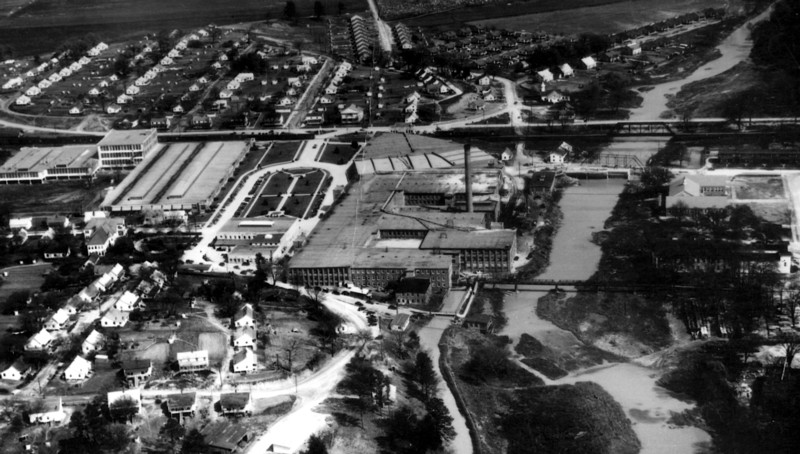
Thanks to Maurene Wallin for sharing her recollections of the Trion Glove Mill.
Photographs courtesy of Susan King, Ben T. Bridges, Bill Barker, Mount Vernon Mills, and Charles Logan.
Return to Business & Industry
Copyright
2012 Greg W. McCollum. All rights reserved.
